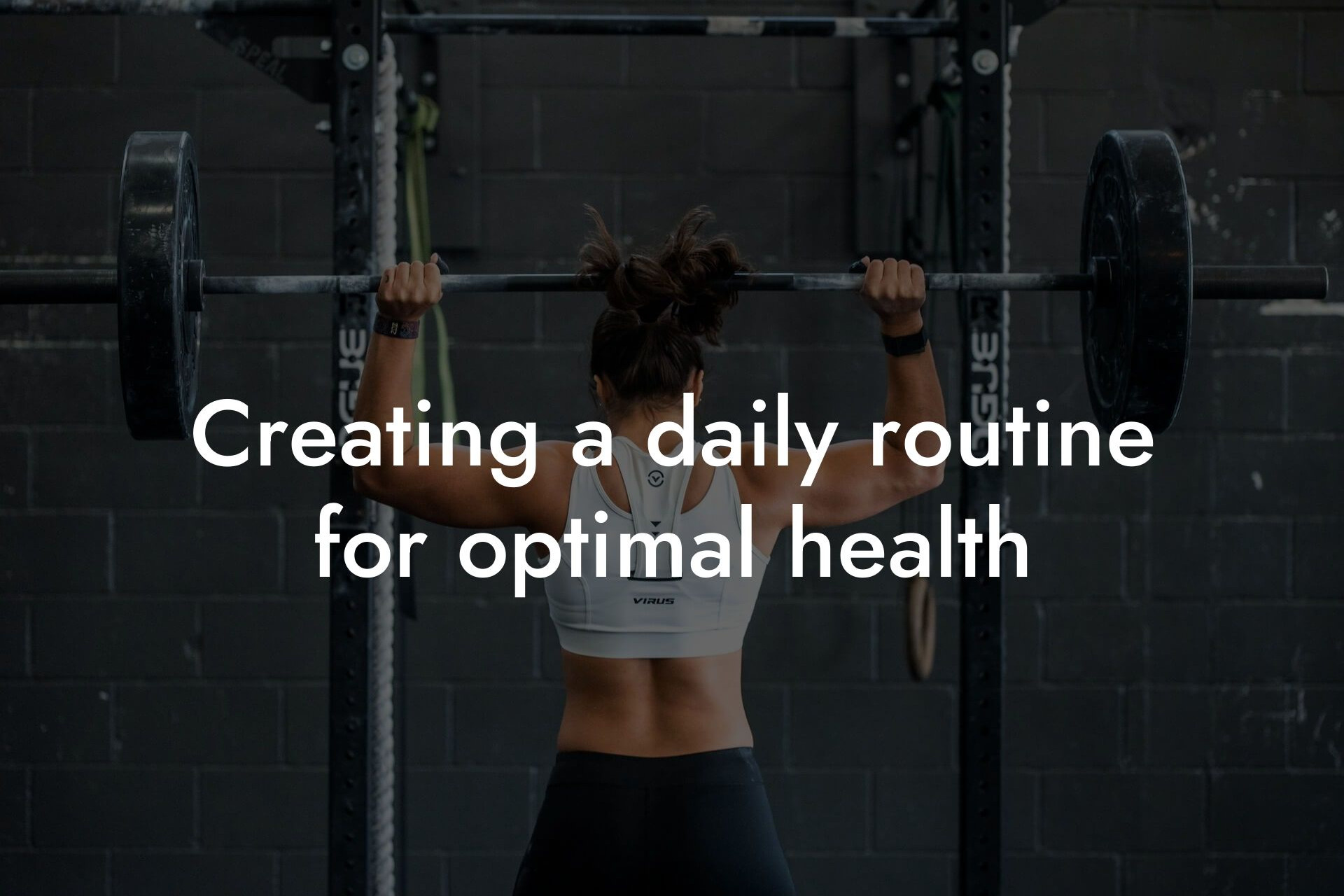As a high-earning professional, you understand the importance of maintaining a healthy lifestyle to achieve long-term success. A strong physical appearance, optimal body fat percentage, and robust bone density are essential for feeling confident, focused, and energized. At Tano Performance Group, we believe that investing in your health is crucial for taking your business to the next level. In this article, we will explore the healthy habits that support long-term success, and how our DEXA machine can provide you with a complete body assessment to help you achieve your goals.
Table of Contents
The Importance of a Balanced Diet
A well-balanced diet is the foundation of a healthy lifestyle. Eating nutrient-dense foods provides your body with the necessary fuel to function optimally, supporting your physical and mental performance. A diet rich in whole foods, fruits, vegetables, lean proteins, and healthy fats can help you maintain a healthy weight, improve your energy levels, and support your overall well-being. On the other hand, a diet high in processed foods, sugar, and unhealthy fats can lead to weight gain, fatigue, and decreased productivity.
As a busy professional, it can be challenging to maintain a healthy diet, especially when you're constantly on-the-go. However, with a little planning and preparation, you can ensure that you're fueling your body with the nutrients it needs to thrive. Consider meal prepping on the weekends, packing healthy snacks, and avoiding fast food and sugary drinks.
Regular Exercise for Optimal Health
Regular exercise is essential for maintaining a healthy weight, improving cardiovascular health, and increasing energy levels. As a professional, you may have a sedentary job, which can lead to a range of health problems, including obesity, diabetes, and cardiovascular disease. However, with regular exercise, you can reduce your risk of developing these conditions and improve your overall health.
Aim to exercise for at least 30 minutes per day, five days a week. This can include cardio exercises, such as running, cycling, or swimming, as well as strength training exercises, such as weightlifting or bodyweight exercises. It's also essential to incorporate flexibility and stretching exercises into your routine to improve your range of motion and reduce your risk of injury.
Getting Enough Sleep for Peak Performance
Sleep is essential for physical and mental recovery. During sleep, your body repairs and regenerates tissues, builds bone and muscle, and strengthens your immune system. Without adequate sleep, you may experience fatigue, decreased productivity, and a weakened immune system.
Aim to get at least 7-8 hours of sleep per night to help your body and mind function optimally. Establish a relaxing bedtime routine, avoid caffeine and electronics before bedtime, and create a sleep-conducive environment to improve the quality of your sleep.
Managing Stress for Long-Term Success
Chronic stress can have a devastating impact on your physical and mental health. It can lead to weight gain, anxiety, depression, and a range of other health problems. As a professional, you may experience high levels of stress, especially during peak periods. However, with effective stress management techniques, you can reduce your stress levels and improve your overall well-being.
Consider incorporating stress-reducing activities into your daily routine, such as meditation, yoga, or deep breathing exercises. Take regular breaks throughout the day, and prioritize self-care activities, such as reading, walking, or spending time with loved ones.
The Importance of Hydration
Hydration is essential for optimal physical and mental performance. Water makes up approximately 60% of your body weight and is necessary for digestion, circulation, and temperature regulation. Without adequate hydration, you may experience fatigue, headaches, and decreased productivity.
Aim to drink at least 8-10 glasses of water per day, and avoid sugary drinks and caffeine, which can dehydrate your body. Consider incorporating hydrating foods, such as watermelon and cucumbers, into your diet, and monitor your urine output to ensure you're drinking enough water.
Building Strong Relationships for Long-Term Success
Strong relationships are essential for long-term success. Surrounding yourself with supportive friends, family, and colleagues can help you stay motivated, focused, and accountable. Building strong relationships can also provide you with a sense of belonging, reduce stress, and improve your overall well-being.
Make time for social activities, such as networking events, team-building exercises, or simply catching up with friends and family. Prioritize communication, active listening, and empathy to build strong, meaningful relationships that will support you throughout your career.
Monitoring Your Progress with DEXA Scans
At Tano Performance Group, we understand the importance of monitoring your progress to achieve long-term success. Our DEXA machine provides a complete body assessment, including body fat percentage, bone density, and muscle mass. With this information, you can tailor your diet and exercise routine to achieve your goals, whether that's improving your physique, increasing your energy levels, or enhancing your overall health.
Our DEXA scans are quick, easy, and non-invasive, providing you with a comprehensive report on your body composition. Our team of experts will work with you to interpret your results, providing you with personalized recommendations to help you achieve your goals.
Achieving long-term success requires a commitment to healthy habits, including a balanced diet, regular exercise, adequate sleep, stress management, hydration, and strong relationships. By incorporating these habits into your daily routine, you can improve your physical and mental health, increase your energy levels, and enhance your overall well-being. At Tano Performance Group, we are dedicated to providing you with the tools and resources you need to achieve your goals, including our comprehensive DEXA scans. Take the first step towards long-term success today.
Frequently Asked Questions
What are healthy habits, and why are they important for long-term success?
Healthy habits are daily practices that promote physical and mental well-being, leading to a better quality of life and increased productivity. They are essential for long-term success because they help maintain energy levels, reduce stress, and improve focus, ultimately contributing to achieving personal and professional goals.
How do healthy habits impact my physical appearance?
Healthy habits such as regular exercise, balanced diet, and sufficient sleep can significantly improve your physical appearance. They help maintain a healthy weight, increase muscle mass, and boost bone density, leading to a more toned and confident physique.
What are some common healthy habits that support long-term success?
Some common healthy habits that support long-term success include regular exercise, meditation, reading, journaling, and getting enough sleep. These habits help improve physical and mental health, increase productivity, and enhance overall well-being.
How can I prioritize healthy habits in my busy schedule?
Prioritizing healthy habits in a busy schedule requires intentional time management and commitment. Start by identifying your most important habits, such as exercise or meditation, and schedule them into your daily routine. Make them non-negotiable, just like any other important appointment.
What is the best way to create a healthy habit?
The best way to create a healthy habit is to start small and be consistent. Choose a habit you want to adopt, such as daily exercise or reading, and start with a manageable goal, like 10-15 minutes a day. Gradually increase the duration and intensity over time, making it a sustainable part of your daily routine.
How long does it take to form a healthy habit?
The amount of time it takes to form a healthy habit varies from person to person, but research suggests it can take anywhere from 18-254 days. The key is to be consistent and patient, as forming healthy habits is a process that requires time, effort, and dedication.
What are some common obstacles to adopting healthy habits?
Common obstacles to adopting healthy habits include lack of motivation, busy schedules, and unrealistic expectations. Additionally, old habits can be hard to break, and new habits can be challenging to adopt. However, with persistence and the right strategies, anyone can overcome these obstacles and develop healthy habits.
How can I stay motivated to maintain healthy habits?
Staying motivated to maintain healthy habits requires a combination of accountability, tracking progress, and celebrating small wins. Share your goals with a friend or family member, use a habit tracker or journal, and reward yourself for milestones achieved. This will help you stay motivated and committed to your healthy habits.
What role does nutrition play in supporting healthy habits?
Nutrition plays a crucial role in supporting healthy habits. A balanced diet provides the necessary energy and nutrients for physical and mental well-being, allowing you to perform at your best and maintain healthy habits. Focus on whole, nutrient-dense foods, and limit processed and sugary snacks.
How does sleep impact my ability to maintain healthy habits?
Sleep is essential for maintaining healthy habits. During sleep, your body repairs and rejuvenates itself, making it easier to stick to your habits. Lack of sleep can lead to fatigue, decreased motivation, and poor decision-making, making it harder to maintain healthy habits. Aim for 7-9 hours of sleep each night.
Can healthy habits improve my mental health?
Yes, healthy habits can significantly improve mental health. Regular exercise, meditation, and social connections can reduce stress and anxiety, improve mood, and increase self-esteem. Additionally, healthy habits can provide a sense of accomplishment and confidence, further enhancing mental well-being.
How can I make healthy habits a part of my daily routine?
Make healthy habits a part of your daily routine by incorporating them into your existing habits. For example, if you already brush your teeth every morning, add a 10-minute meditation session or a quick workout to your routine. This will help you create a consistent habit loop and make healthy habits feel automatic.
What are some healthy habits for improving body composition?
Healthy habits for improving body composition include regular resistance training, high-intensity interval training (HIIT), and a balanced diet with a caloric deficit. Additionally, getting enough sleep, managing stress, and staying hydrated can also support body composition goals.
How can I track my progress and stay accountable?
Track your progress and stay accountable by using a habit tracker, journal, or mobile app. Share your goals and progress with a friend or accountability partner, and schedule regular check-ins to review your progress and make adjustments as needed.
What are some common mistakes people make when trying to adopt healthy habits?
Common mistakes people make when trying to adopt healthy habits include setting unrealistic goals, trying to change too much at once, and lacking a clear plan or strategy. Additionally, not tracking progress, being too hard on oneself, and giving up too easily can also hinder success.
How can I overcome setbacks and stay on track with my healthy habits?
Overcome setbacks and stay on track with your healthy habits by being kind to yourself, acknowledging the setback, and getting back on track as soon as possible. Don't let one setback derail your entire progress. Instead, focus on moving forward and celebrating small wins.
What role does mindset play in adopting and maintaining healthy habits?
Mindset plays a crucial role in adopting and maintaining healthy habits. A growth mindset, self-awareness, and a positive attitude can help you overcome obstacles, stay motivated, and make healthy habits a sustainable part of your lifestyle.
How can I make healthy habits a part of my long-term strategy for success?
Make healthy habits a part of your long-term strategy for success by incorporating them into your daily routine, tracking progress, and celebrating small wins. Focus on the process, not just the outcome, and be patient with yourself as you work towards your goals.
What are some healthy habits for improving bone density?
Healthy habits for improving bone density include regular weight-bearing exercise, such as strength training or high-impact aerobics, a diet rich in calcium and vitamin D, and getting enough sleep. Additionally, reducing stress and avoiding excessive caffeine and alcohol consumption can also support bone health.
How can I balance healthy habits with work and family responsibilities?
Balancing healthy habits with work and family responsibilities requires intentional time management, prioritization, and communication. Schedule healthy habits into your daily routine, involve your family in your goals, and be flexible when needed. Remember, taking care of yourself is essential to being a productive and present professional and family member.
What are some healthy habits for improving physique?
Healthy habits for improving physique include regular resistance training, a balanced diet with a caloric deficit, and getting enough sleep. Additionally, incorporating high-intensity interval training (HIIT), stretching, and foam rolling can also support physique goals.
How can I make healthy habits a part of my identity?
Make healthy habits a part of your identity by incorporating them into your daily routine, surrounding yourself with like-minded individuals, and celebrating small wins. As you make progress and see results, your identity will shift to include healthy habits as a core part of who you are.
What are some common myths about healthy habits?
Common myths about healthy habits include the idea that you need to make drastic changes to see results, that healthy habits are only for young people, or that you need to be perfect to maintain healthy habits. Remember, small changes can add up over time, and healthy habits are for anyone, regardless of age or fitness level.
Here are some related articles you might love...
- Creating a daily routine for optimal health
- Social support and its role in achieving fitness goals
- Time management tips for maintaining a healthy lifestyle
- Balancing indulgence and discipline in diet and fitness
- The role of sleep in achieving body composition goals
- Travel tips for maintaining your physique
- The importance of regular health check-ups
- How to integrate fitness into a demanding work schedule
- How to manage work stress and its impact on physical health
Zak Faulkner
Zak Faulkner is a leading authority in the realm of physical health and body composition analysis, with over 15 years of experience helping professionals optimise their fitness and well-being. As one the experts behind Tano Performance Group, Zak has dedicated his career to providing in-depth, science-backed insights that empower clients to elevate their physical performance and overall health.
With extensive knowledge of DEXA technology, Zak specializes in delivering comprehensive body assessments that offer precise data on body fat, muscle mass, bone density, and overall physique. His expertise enables individuals to make informed decisions and achieve their fitness goals with accuracy and confidence. Zak’s approach is rooted in a deep understanding of human physiology, combined with a passion for helping clients unlock their full potential through personalised strategies.
Over the years, Zak has earned a reputation for his commitment to excellence, precision, and client-focused service. His guidance is trusted by top professionals who demand the best when it comes to their health. Whether advising on fitness programs, nutritional strategies, or long-term wellness plans, Zak Faulkner’s insights are a valuable resource for anyone serious about taking their health and fitness to the next level.
At Tano Performance Group, Zak continues to lead our Content Team revolutionising how professionals approach their physical health, offering unparalleled expertise that drives real results.




